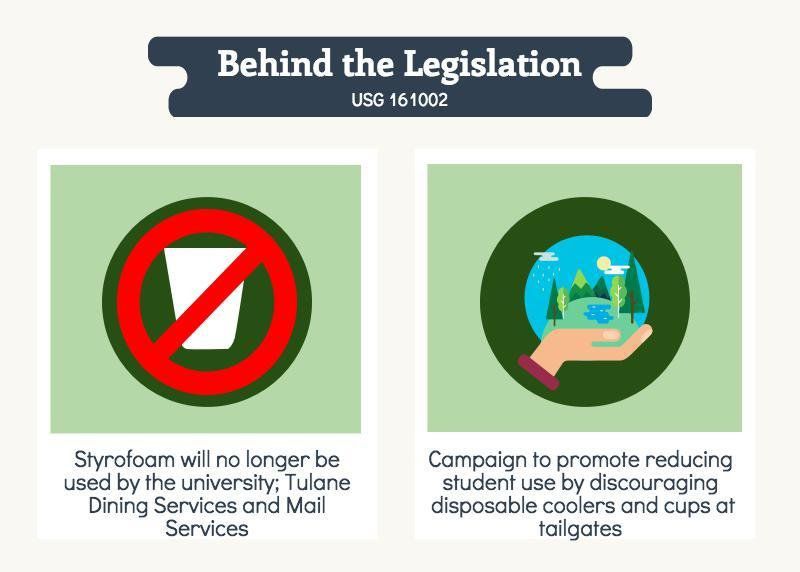USG legislation discourages Styrofoam use on campus
November 16, 2016
Undergraduate Student Government passed legislation Tuesday which aims to make Tulane’s campus a more environmentally friendly space by advocating for the reduction of Styrofoam use.
USG 161002, co-authored by the USG Director of Sustainability Noa Elliot and USG Executive Vice President Sam Levin, recommends that Tulane University Dining Services phases out the use of Styrofoam in all dining facilities around campus and replaces containers with non-Styrofoam alternatives. The initiative would be implemented by Aug. 1, 2017.
“The legislation is essentially a resolution that states that the USG supports creating a campaign on campus to discourage the use of Styrofoam and that would be initiated in Tulane Dining Services … then in any sort of packing, so like those little [packaging] peanuts and what not,” Elliot said.
The legislation specifically acknowledged the impact of polystyrene foam, better known by its brand name Styrofoam.
According to the Earth Resource Foundation, many substances found in Styrofoam are not biodegradable, meaning bacteria or other organisms cannot break them down and that they will remain in environments indefinitely.
The primary concern with using Styrofoam is the damage the chemical components of Styrofoam, specifically styrene, cause to ecosystems. The Environmental Protection Agency classifies styrene as a human carcinogen, which can lead to negative health ramifications such as depression, headache, fatigue and impaired kidney and blood functions.
Elliot said that in addition to needing to prioritize better environmental policies on campus like USG 161002, EcoWatch ranks Tulane as the “Greenest College Campus” in Louisiana, with a score of 8.5 out of 10 points.
“There’s no real reason for [Tulane] to be using [Styrofoam] … as the leading green school in Louisiana,” Elliot said.
Elliot said the legislation would also call for a campaign that would strategically place yard signs around campus with information about the damaging effects of Styrofoam on the environment and how students can reduce their usage.
“You’ll see things around discouraging the use of Styrofoam. That would be major in terms of getting those disposable coolers discouraged from tailgates and stuff like that,” Elliot said. “There’s a lot of places where Styrofoam is used where students don’t think actively about it because I think it’s thought of a lot in terms of food.”
The campaign, however, could only discourage the use of Styrofoam at tailgates and not entirely ban its use at Tulane tailgates by individuals.
“We can’t prohibit the use of Styrofoam at tailgates because it’s private people, but the campaign would be part of discouraging that and then also eliminating the use of it by Tulane channels,” Elliot said.
Despite the legislation not being able to fully ban Styrofoam use on Tulane’s campus, Shehan McFadden, junior and senator for the School of Liberal Arts, said she is hopeful about the legislation’s success.
“I think that [the legislation] a really great step towards a more sustainable and environmentally friendly Tulane and honestly, a really easy step for us to take, so I hope to see it work out,” McFadden said.










Leave a Comment